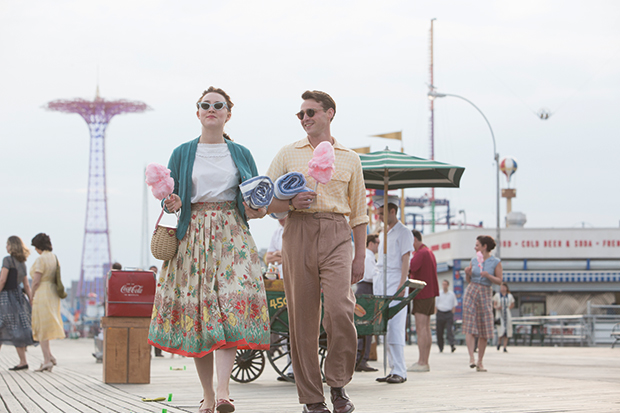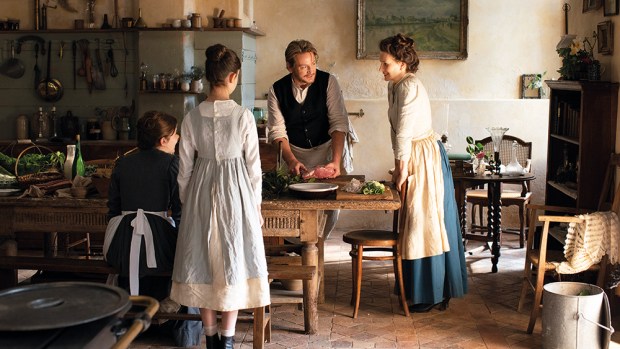Brooklyn is a wee slip of a thing compared to the Bond film, Spectre, and cost $12 million, as opposed to $300 million, but what it lacks in length, budget, pre-title stunt sequences, theme songs, sports cars, exotic locales, babes in stages of undress, villains with master plans, Omega watches, rooftops chases, speedboats and exploding buildings, it more than makes up for with real storytelling and real feeling, which you just can’t create from post-production CGI, don’t you know.
Based on the wonderful novel by Colm Tóibín, with a script by Nick Hornby, and directed by John Crowley (who has come up through the theatre, and whose screen work includes Boy A and Intermission), this is old-fashioned, traditional storytelling at its most exquisite and moving; a tearjerker that doesn’t put a foot wrong, and doesn’t make you feel as if you’ve been had. (My tears are so easily jerked I always feel I’ve been had unless, as in this instance, I am willing to concede the film has earned it.) It stars Saoirse (pronounced ‘Seer-Shah’) Ronan as Eilis (pronounced ‘Aye-Lish’), a young Irish woman who emigrates to America in the 1950s and has a sister called Rose, pronounced ‘Rose’, which is a relief.
The film opens, lushly and lyrically — the cinematography is lush and lyrical throughout — in the small town of Enniscorthy, in Wexford, where Eilis works for a few days a week in the grocery shop owned by Miss Kelly (Brid Brennan), known as Nettles Kelly, because she is nasty and stings. Eilis lives with her widowed mother (Jane Brennan) and Rose (Fiona Glascott), but there’s nothing for her here, beyond Nettles Kelly so, with the help of the church, her passage has been arranged to New York, where she might pursue a better life for herself. Eilis undertakes the grim boat journey — when both ends are erupting, a fire bucket can be supremely useful, is all I will say — to a Brooklyn boarding house where the landlady is a scene-stealing Julie Walters, and to a job in a department store, where she is constantly ticked off for her shy awkwardness. She is desperately homesick, and weeps with the strangeness of it all, and with the loneliness of it all, and is sometimes comforted by a kindly priest (Jim Broadbent). She helps him out on Christmas day, serving dinners to the homeless old Irish fellas who had built the tunnels and the railways and the skyscrapers and when one gets up to sing an Irish song, I was truly gone. Sounds maudlin, and sentimental, and in lesser hands it would have been, but Crowley allows the song to simply do its work, with no close-ups, and it is not just beautiful, but says everything you need to know about yearning for home without actually saying anything at all.
Initially, Eilis is a fairly dull instrument to whom stuff happens — quite like Bond, in fact — but, unlike him, she slowly starts to grow. Or is it quickly? Hard to tell. Although everything happens at a lick, it also feels languid, because such care has been taken with the colouring in, with the small but telling moments which may amount to little more than a look, or an exchange, or a funny vignette, as when her fellow boarders teach her how to eat spaghetti (‘Yer splashin’!). So she grows, either quickly or slowly, and enrols at night school, and falls for a sweet Italian plumber (Emory Cohen and, get this, there is real bone fide chemistry between the two!), and changes before our eyes. Her clothes become more colourful and sophisticated. She purchases an emerald swimsuit for the inevitable trip to Coney Island. She begins to assert herself, as a woman and as a sexual being. But just as she’s poised to properly take flight, something dreadful happens back home — further tears were jerked, and quite a lot of them — and she has to return.
This is a film about belonging, then not belonging, then starting to belong, then having to choose between your old sense of belonging and your new sense of belonging, and that’s enough belongings to be getting on with, I think. It is about the immigrant experience generally, and how we define home, as well as the tough, personal decision Eilis must make when she meets another man (Domhnall Gleeson). We care deeply about the main characters, who are allowed to be complex — Eilis’s mother, for example, is both selfish and sacrificial — and you will be blown away by the power of Ronan’s performance, which is a triumph of nuanced expressiveness; just the slightest adjustment to her body language and we know all that is happening within. This is a film to enter your heart and your bones. This is film to carry with you beyond next week. And not an Aston Martin in sight. Fancy.
Got something to add? Join the discussion and comment below.
Get 10 issues for just $10
Subscribe to The Spectator Australia today for the next 10 magazine issues, plus full online access, for just $10.
You might disagree with half of it, but you’ll enjoy reading all of it. Try your first month for free, then just $2 a week for the remainder of your first year.














Comments
Don't miss out
Join the conversation with other Spectator Australia readers. Subscribe to leave a comment.
SUBSCRIBEAlready a subscriber? Log in